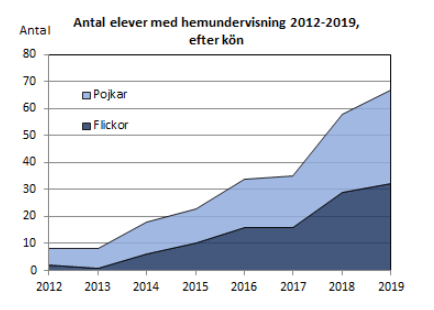Press Release: Åland, a Swedish speaking Finnish archipelago in the Baltic Sea, has the world’s highest percentage of homeschoolers after the USA, due to immigration from Sweden, where homeschooling is illegal. Åland’s official statistics show that 2.2% of school aged children are homeschooled. This means that Åland has one of the highest concentrations of homeschooling in the world, compared to the USA where almost 3% of children are homeschooled. The majority of homeschooled children on Åland are Swedish citizens who moved subsequent to the forbidding of homeschooling in Sweden following the country’s school law passed in 2011.
Homeschooling Continues to Increase
In 2012 there were only 8 homeschooled children on Åland. Since then, the proportion of homeschooled children has increased by 40% per year.

The number of homeschooled students on Åland from 2012-2019 by gender.
Boys in light blue. Girls in dark blue.
As of fall 2019, there are 67 homeschooled children. 57% live in the villages, 39% in (the capital) Mariehamn and 4 percent on the outlying islands. The total number of school children (on Åland, excluding upper secondary) is 3068. This means that 2.2% of school age children on Åland are homeschooled, the majority of them born in Sweden.
School Refugees
Sweden forbade homeschooling in 2011. After that, families wishing to homeschool have moved to Åland. The reason Åland became the destination for these school refugees is due to its geographical proximity to Sweden and the fact that the Swedish language is dominant on the Åland islands. Since Åland belongs to Finland, the law requires that children be educated rather than that they attend school. There are also Swedish homeschooling families in Denmark, Norway, England and the USA. All these countries have laws and educational systems that support this ever growing method of education.
“What is so interesting about Åland is that it has become home to a critical mass of homeschooling families.”, says Jens Peter de Pedro of the education think tank Tillit. “The families know each other and their children gather for social events during the day. There are also ongoing negotiations to create a learning center for homeschoolers with support of the Åland education authorities.”
“It is not inconceivable that education in the near future will be more flexible and that our youth will switch freely back and forth between home and school. This is exactly why homeschooling is so interesting to investigate as a method of education.”, says Jens Peter de Pedro.
Here is the full report from The Official Statistics Authority of Åland (in Swedish):
Tankesmedjan Tillit is an independent think tank that promotes Educational Diversity and Self-Directed Education.
